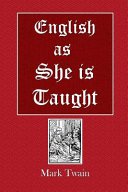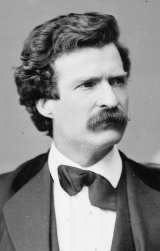English as She is Taught Page #4
As the greatest compliment that could be paid a writer would be the assumption that the material contained in this little volume was the product of that writer's ingenuity or imagination, it seems needless for the compiler to state that every line is just what it purports to be, - bona fide answers to questions asked in the public schools. Mark Twain, with his inimitable drollery, comments in the "Century Magazine" for April, 1887, upon "English As She is Taught." Even this master of English humor acknowledges his inability to comprehend how such
sugar cane. The olfactory nerve enters the cavity of the orbit and is developed into the special sense of hearing. The growth of a tooth begins in the back of the mouth and extends to the stomach. If we were on a railroad track and a train was coming the train would deafen our ears so that we couldn’t see to get off the track. If, up to this point, none of my quotations have added flavour to the Johnsonian anecdote at the head of this article, let us make another attempt: The theory that intuitive truths are discovered by the light of nature originated from St. John’s interpretation of a passage in the Gospel of Plato. The weight of the earth is found by comparing a mass of known lead with that of a mass of unknown lead. To find the weight of the earth take the length of a degree on a meridian and multiply by 62½ pounds. The spheres are to each other as the squares of their homologous sides. A body will go just as far in the first second as the body will go plus the force of gravity and that’s equal to twice what the body will go. Specific gravity is the weight to be compared weight of an equal volume of or that is the weight of a body compared with the weight of an equal volume. The law of fluid pressure divide the different forms of organized bodies by the form of attraction and the number increased will be the form. Inertia is that proberty of bodies by virtue of which it cannot change its own condition of rest or motion. In other words it is the negative quality of passiveness either in recoverable latency or insipient latescence. If a laugh is fair here, not the struggling child, but the unintelligent teacher—or rather the unintelligent Boards, Committees, and Trustees—are the proper target for it. All through this little book one detects the signs of a certain probable fact—that a large part of the pupil’s “instruction” consists in cramming him with obscure and wordy “rules” which he does not understand, and has no time to understand. It would be as useful to cram him with brickbats; they would at least stay. In a town in the interior of New York, a few years ago, a gentleman set forth a mathematical problem and proposed to give a prize to every public-school pupil who should furnish the correct solution of it. Twenty-two of the brightest boys in the public schools entered the contest. The problem was not a very difficult one for pupils of their mathematical rank and standing, yet they all failed—by a hair—through one trifling mistake or another. Some searching questions were asked, when it turned out that these lads were as glib as parrots with the “rules” but could not reason out a single rule or explain the principle underlying it. Their memories had been stocked, but not their understandings. It was a case of brickbat culture, pure and simple. There are several curious “compositions” in the little book, and we must make room for one. It is full of naïveté, brutal truth, and unembarrassed directness, and is the funniest (genuine) boy’s composition I think I have ever seen: ON GIRLS. Girls are very stuckup and dignified in their manner and be have your. They think more of dress than anything and like to play with dowls and rags. They cry if they see a cow in a far distance and are afraid of guns. They stay at home all the time and go to church on Sunday. They are al-ways sick. They are al-ways funy and making fun of boy’s hands and they say how dirty. They cant play marbles. I pity them poor things. They make fun of boys and then turn round and love them. I don’t beleave they ever killed a cat or anything. They look out every nite and say oh ant the moon lovely. Thir is one thing I have not told and that is they al-ways now their lessons bettern boys. From Mr. Edward Channing’s recent article in “Science”: The marked difference between the books now being produced by French, English, and American travellers, on the one hand, and German explorers on the other, is too great to escape attention. That difference is due entirely to the fact that in school and university the German is taught, in the first place to see, and in the second place to understand what he does see. ------------------------------------------------------------------------ English as She is Taught. I. Etymological. Aborigines— a system of mountains. Aboriginal— what was original before. Aboriginate— to settle down in a place. Alias— a good man in the Bible. Alienate— to put together. to make a citizen of. to make a foreigner. to live in another country except your own. Amenable— any thing that is mean. Ammonia— the food of the gods. Animosity— a sudden surprise. kindness. thoughtfullness. an emblem or sign. great liveliness. Aristocracy— to be stuck up. Armistice— one who takes part in battle. Asphyxia— a grumbling fussy temper. Assiduity— state of being an acid. Audible— worthy of applause. Auriferous— giving light from yourself. pertaining to an orifice. Beneficence— a state of insanity. Burglarize— to make burglars. Capillary— a little caterpiller. Cassowary— a kind of dromedary. Centaur— a three legged animal. Conjugate— to all wrinkle up. Conservative— a person interested in politics who does not like Mr. Gladstone. Corniferous— rocks in which fossil corn is found. Crosier— a staff carried by the Deity. Culinary— cunning or cute. Delineate— to deface. to make lean. Demagogue— a vessel containing beer and other liquids. Egregious— the art of learning. feeding on flocks. a good many sheep together. Emissary— a foreign missionary. Emolument— a softening. a structure. a great increase. a headstone to a grave. Epicac— a man who likes a good dinner. Equanimity— evenness of time. carefullness. being equal all round. Equestrian— an equal. a competetor. one who asks questions. one who walks on foot. Erudition— act of wiping out. state of being erude. Espionage— a kind of cabbage. Eucharist— one who plays euchre. Exhilarate— pertaining to happiness. Franchise— any thing belonging to the French. Freebooter— a man three feet high. Idolater— a very idol person. Ignition— the art of not noticing. Impetuosity— to get into a pet.
Translation
Translate and read this book in other languages:
Select another language:
- - Select -
- 简体中文 (Chinese - Simplified)
- 繁體中文 (Chinese - Traditional)
- Español (Spanish)
- Esperanto (Esperanto)
- 日本語 (Japanese)
- Português (Portuguese)
- Deutsch (German)
- العربية (Arabic)
- Français (French)
- Русский (Russian)
- ಕನ್ನಡ (Kannada)
- 한국어 (Korean)
- עברית (Hebrew)
- Gaeilge (Irish)
- Українська (Ukrainian)
- اردو (Urdu)
- Magyar (Hungarian)
- मानक हिन्दी (Hindi)
- Indonesia (Indonesian)
- Italiano (Italian)
- தமிழ் (Tamil)
- Türkçe (Turkish)
- తెలుగు (Telugu)
- ภาษาไทย (Thai)
- Tiếng Việt (Vietnamese)
- Čeština (Czech)
- Polski (Polish)
- Bahasa Indonesia (Indonesian)
- Românește (Romanian)
- Nederlands (Dutch)
- Ελληνικά (Greek)
- Latinum (Latin)
- Svenska (Swedish)
- Dansk (Danish)
- Suomi (Finnish)
- فارسی (Persian)
- ייִדיש (Yiddish)
- հայերեն (Armenian)
- Norsk (Norwegian)
- English (English)
Citation
Use the citation below to add this book to your bibliography:
Style:MLAChicagoAPA
"English as She is Taught Books." Literature.com. STANDS4 LLC, 2024. Web. 22 Dec. 2024. <https://www.literature.com/book/english_as_she_is_taught_262>.




Discuss this English as She is Taught book with the community:
Report Comment
We're doing our best to make sure our content is useful, accurate and safe.
If by any chance you spot an inappropriate comment while navigating through our website please use this form to let us know, and we'll take care of it shortly.
Attachment
You need to be logged in to favorite.
Log In